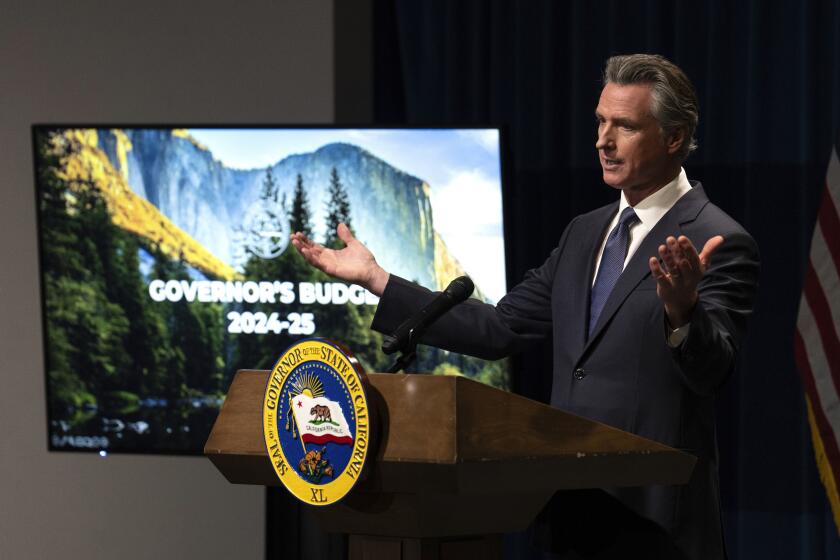
- Share via
Investments geared toward combating climate change and transitioning away from fossil fuels are among the items on the chopping block as California Gov. Gavin Newsom seeks to close a $37.9-billion budget deficit.
The governor’s proposed 2024-25 budget, unveiled Wednesday, would see the state’s multiyear climate budget reduced to $48.3 billion — down 11% from the $54 billion approved in 2022. Among the trims are clean transportation programs and others that address forest maintenance, watershed resilience, coastal protection and sea level rise.
Newsom’s administration characterized the cuts as “limited” and said they will maintain the state’s momentum toward climate goals.
“$48.3 billion is a world-leading figure that exceeds [that of] many nations,” said Lauren Sanchez, Newsom’s senior climate advisor.
Aggressive and impactful reporting on climate change, the environment, health and science.
She was one of many administration officials who focused on what they considered wins in the proposal. They noted that the governor was able to protect 89% of the existing climate budget even in the face of major deficits, and that many programs would remain intact, or close to it.
But some environmental groups were disappointed by the proposal, which would cut $2.9 billion in climate funding; delay an additional $1.9 billion; and shift $1.8 billion to other funds, primarily the state’s Greenhouse Gas Reduction Fund, which receives proceeds from cap-and-trade auctions.
“It’s a tough economic moment for sure,” said Mary Creasman, chief executive of California Environmental Voters. “At the same time, we would have hoped for a little bit more of a courageous proposal — something that is more creative and solutions-oriented about how to fund the transition that is so desperately needed toward clean energy and resilience.”
State officials stressed that the administration remains focused on accelerating California’s clean energy future and underscored progress made toward renewable energy resources and zero emission vehicles.
Yet the proposed budget includes notable trims for zero emission vehicle programs, including $600 million in delayed funds for the Clean Cars 4 All equity project and grants for electric fueling infrastructure. Creasman said that she was looking forward to drilling down into the details, but that the top-line figures did not reflect the urgency of the climate crisis.
“I feel like a broken record, but the cost of inaction is too great,” Creasman said. “There are real opportunities on the table to fund this transition, and California has globally relevant targets in place on emissions reductions and goals. ... And yet we are not going to meet those unless we fund the work. That is our biggest obstacle left in the state.”
With weaker revenues than expected, Gov. Gavin Newsom wants to declare a budget emergency and ask California lawmakers to dip into the state’s reserves.
The proposal arrived only days after officials confirmed that 2023 was Earth’s warmest year on record. The year was marked by devastating wildfires, destructive floods and deadly heat waves — issues that are only expected to get worse in California and worldwide due to human-caused climate change.
But water, wildfire and heat were among the categories to see cuts under the proposed budget.
“The budget was horrible for all things wet,” said Mark Gold, director of water scarcity solutions for the Natural Resources Defense Council. “During a time of growing climate crisis and water scarcity concerns, seeing massive cuts in funding for water reuse, groundwater management and remediation, watershed and coastal resilience, and marine life protection is beyond disheartening. Climate and water resilience efforts cannot be further delayed.”
Among the proposed cuts are $350 million for various watershed climate resilience programs over the next two years; a delay of $100 million for water recycling and groundwater cleanup; a reversion of $50 million in general funds intended for dam safety investments; and a $30-million reduction in funds earmarked for the mitigation of per- and polyfluoroalkyl substances, also known as PFAs or “forever chemicals,” that pollute the environment.
Gold pointed out that the cuts also include more than $400 million in reductions for coastal resilience programs, at a time when the state has recently weathered extreme storms and damaging flooding.
“I’d say proportionately the coast took the biggest hit,” Gold said. Many of the large cuts “align directly with the climate stressors that have caused so much harm in the state of California, and that’s just beyond concerning,” he said.
With a global average temperature of 58.96 degrees, the year was nearly one-third of a degree warmer than the previous hottest year on record, according to officials.
There were other environmental blows as well, including a net reduction of $40.1 million for the state’s Extreme Heat and Community Resilience Program. An additional $100.7 million would be trimmed from wildfire reduction programs, including fuel treatment efforts and home hardening projects.
Wade Crowfoot, California’s natural resources secretary, said the budget maintains 95% of the $2.8 billion allocated toward wildfire resilience projects over the last five years, and said the California Department of Forestry and Fire Protection will continue to get new resources to fight fires.
Toks Omishakin, secretary of the California State Transportation Agency, said similarly that the state is facing some “dark financial storm clouds,” but that it’s important to focus on silver linings.
“And when it comes to transportation, I believe there are many,” he said. “Notably, while the budget proposals for transportation contain some funding shifts and delays, we’re able to maintain roughly 99% of funding in the governor’s historic transportation infrastructure package.”
Sanchez, Newsom’s climate advisor, said the state has also secured more than $10 billion in federal funding through President Biden’s Inflation Reduction Act, which will make up for some of the cuts at the state level and go toward water resilience, clean transportation projects, clean energy and more.
“The governor’s budget maintains critical climate investments for schools, jobs, housing and health,” Sanchez said. “Our budget also continues to prioritize equity and investments in underserved populations, which face disproportionate harm from pollution and from the climate crisis.”
State prosecutors call major oil companies “substantially responsible for causing and accelerating climate change.” Atty. Gen. Rob Bonta said it’s time they pay “to abate the harm they have caused.”
In his remarks on Wednesday, Newsom vowed to continue to “hold Big Oil accountable” for its role in the climate crisis. That includes a recommendation in the budget to eliminate some subsidies that benefit oil and gas corporations, such as those geared toward intangible drilling costs and allowances for economic credits, among other items.
Barry Vesser, chief operating officer with the Climate Center, said in a statement that those were wise recommendations but the governor should go even further and eliminate all tax breaks and subsidies for fossil fuel corporations.
“While it won’t close the deficit entirely, ending all of Big Oil’s subsidies would free up billions to invest in growing the skilled and trained clean energy workforce, implement sustainable agricultural practices, deploy more clean energy and storage, and carry out other initiatives now on the chopping block,” he said.
Presenting his proposal, Newsom indicated his administration will continue moving ahead with a long-term plan to build a giant water tunnel in the Sacramento-San Joaquin River Delta, saying “there’s a lot of momentum” on that and other water infrastructure projects.
Environmental activists criticized the governor for pursuing the multibillion-dollar tunnel project while cutting other spending this year.
“It will waste at least $16 billion that could be spent on actual climate resilience projects,” said Barbara Barrigan-Parrilla, executive director of the group Restore the Delta. “This is not serious climate water planning.”
Some experts were critical not only of the numbers but of the process itself. There is a “mismatch” between the budget’s articulation of the state’s climate challenges and its proposed solutions, said Laurie Wayburn, chair of the California Natural and Working Lands Expert Advisory Committee.
The traditional framework tends to silo issues such as wildfires, droughts and extreme heat away from integrated solutions such as carbon emission reductions and nature-based solutions, she said.
“As a result, that kind of fractionation really doesn’t help you understand either the level of investment very directly, or the impact,” Wayburn said.
She added that although California has undoubtedly made pioneering advancements in the climate space, “the budget doesn’t yet reflect that.”
Katelyn Roedner Sutter, California state director for the Environmental Defense Fund, said climate funding is critical.
“We get one shot to protect California communities from a future shaped by extreme heat, drought, wildfires, and harmful pollution but the state is not yet acting at the scale required for success,” Roedner Sutter said. “Bold action this decade provides our best chance to prevent a catastrophic climate future.”
Others praised the governor’s decision to preserve investments in providing safe drinking water in communities where people live with contaminated tap water.
“We’re heartened to see this program maintained and look forward to ensuring critical drinking water projects continue to move forward with the urgency they deserve,” said Kyle Jones, policy and legal director for the Community Water Center.
Toward a more sustainable California
Get Boiling Point, our newsletter exploring climate change, energy and the environment, and become part of the conversation — and the solution.
You may occasionally receive promotional content from the Los Angeles Times.












